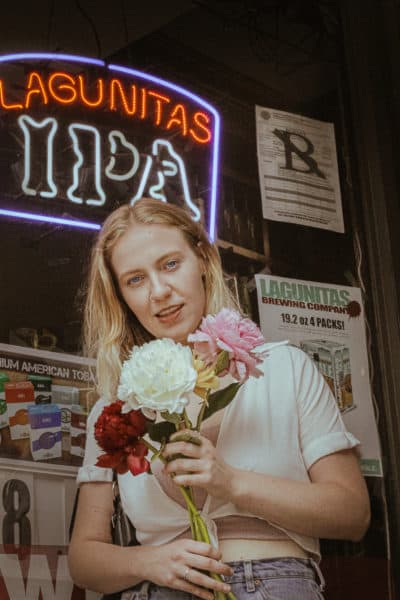Advertisement
The Art Of Writing Songs For Social Change, From Berklee College Of Music Students
ResumeFirst, a note from the reporter: This story is best ingested through the ears.
Messages for social change come in all different forms — from protest signs to boycotts to public art. Over the past few months students from Berklee College of Music have turned their convictions into song for the school's annual “Songs for Social Change” contest.
Listen to a playlist of selected entries:
Each year's crop is of course unique depending on the state of the world, but similar themes tend to emerge, according to associate professor of songwriting Mark Simos. As facilitator he works with eight judges and enjoys tracking which issues matter most to students over time.
“We really try to judge the song more than the performance or the production,” Simos explained. “Sometimes winning songs are very spare in terms of their instrumentation.”
That's especially true this year. Berklee extended the contest deadline after the pandemic forced the school to shift to remote learning. Simos encouraged students to send in even very rough demos from wherever they were locked down. Ninety submissions rolled in, representing students from places including Hong Kong, Macedonia, Singapore, India and 16 U.S. states.
“These songs all got submitted really before the pandemic hit in full,” Simos recalled, “although there were some songs that dealt with that theme.”
Student Madison Simpson submitted her fictional, narrative ballad, “Quilt Too Big to Fold,” which is about the AIDS epidemic. Today it “winds up having some eerie significance,” Simos said.
Simpson is from Concord, New Hampshire, and recorded the song with her musical partner. Together they form the Americana duo Sweet Petunia.
“When I was writing this song the first line that came to me was the refrain line,” Simpson recalled, which is, “Nancy, you're the smartest girl I know, but all you do is sit all day and sew.”
Simpson's lyrics are inspired by the enormous AIDS Memorial Quilt that celebrates the lives of people who died because of that pandemic. “It's constantly growing,” she said. “It's the largest piece of community folk art, and just so large that it can't even be shown in one place anymore.”
The quilt was conceived in the 1987 and today is estimated to weigh 54 tons.
“If you listen to the song you can hear the threads of the quilt in the way that the melodies and the lyrics are woven together,” Simos said of the ballad Simpson wrote for his roots songwriting class.
In it, her character Nancy stitches a fabric square to honor a loved one who contracts the disease. It's a heartbreaking piece that humanizes the people who were ostracized and blamed for getting AIDS. And it recognizes their loved ones who were left behind.
“Walking through the room as she got sicker, feeling like I'm already alone,” Simpson sings as Nancy, “sitting as she couldn't lift her own head, lying next to her she felt so cold.”
Simpson, who's bisexual, says a lot people — especially young people — don't know about the millions of people who died during the AIDS crisis. She hopes her song will inspire others to learn more.
“This crisis was a really large part of our history, whether you're gay or straight or whatever,” Simpson said. “And it's still impacting us as a society today.”
While Simpson's song comes from a personal place, it's not autobiographical, but Berklee senior Gaya Menon's “Privilege to Dream” is. It won first place in the contest and is about her and her family's experience as immigrants in Doha, Qatar. Her dad migrated there from India in 1990.

“We're still on a visa,” Menon said, because Qatar doesn't grant citizenship readily. “So despite having given most of our lives to this place, and contributing to its economy and building a family and home there, we're deprived of a lot of privileges, certain rights like owning land.”
Simos points to Menon's choice to repeat questions that probe the concept of privilege in both Qatar and the U.S. where she's also on a visa as an international student.
One line asks, “How do you call yourself the land of the free, when you make me hide my faith because you disagree?” In another Menon sings, “How do you call yourself the land of the kind, when we're forced to leave when dad retires?”
Simos says posing questions is a powerful songwriting device that invites listeners into Menon's story. He also points to the title itself.
"...so much of the theme that's living now in people's minds is that privilege is something that is invisible largely to the people that have benefited from it."
Mark Simos
“These songs were all submitted to the contest during the pandemic and before the Black Lives Matter protests began,” he said. “But so much of the theme that's living now in people's minds is that privilege is something that is invisible largely to the people that have benefited from it.”
According to Simos, contest judge and Berklee faculty member Prince Charles Alexander — a multi-platinum engineer and producer for recording artists including Mary J. Blige and Aretha Franklin — said he cried every time he listened to Menon's song and called it “flawless.”
Menon hopes the people who hear her words will stay aware of issues that pertain to people who are all around them. “This country is built on immigrants,” she said, “and they have a story, too.”
The young musician's biography imbues the song with authenticity, even if it's not explicit. Her words offer a meditation on the concept of privilege, including the ending line, “So it's clear to see if you're destined to be me it's a privilege to dream.”
In our interview Menon said, “We don't choose the circumstances that we're born into, you know? And therefore I shouldn't have to be defined by them.”
Simos acknowledged it might feel a little awkward for the winning writers to talk about their songs. He said the contest's judges did not have the benefit of a coffeehouse-style introduction before listening to each submission, and that's the way they like it.
“As songwriting teachers we actually encourage people to trust the song to do its own work,” Simos said. Second place winner Al Riordan enthusiastically concurred. “The song does it way better than anything that I can say,” she shared with a laugh.

Riordan is from Newcastle, Australia. Her winning song “Listen and Love” is complex and layered with compassion, opening with the line, “I want to write a song to the girls who are afraid to share their story, to the girls that were hurt and were told that they were wrong.”
Riordan explained how the song comes from her own experience as a woman who's been raped and sexually assaulted. “But I really wanted to try and extend the message to all kinds of pain from all different people,” she said.
Riordan wrote and mixed her song the day before the contest's deadline after coming up with this line: “If only the world was a place where people wouldn't sew other's pain into T-shirts to wear as their own, I think that that'd be a place we'd all like to know.”
Simos said that particular lyric really landed with the judges. "When you're a songwriter, there are certain lines that just kind of kill you and you just kind of go, 'Oh, I wish I had written that line!' "
Like a lot of the songs submitted this year, Simos said Riordan's entry channels a kind of “next-level” social awareness about what it means to be an ally in today's world. The chorus channels the type of positive social change its writer would like to see.
“So when someone shares their story don't say, 'Me too',” Riordan sings, “say 'I see you and I'm sorry that happened to you. Listen, listen and love.”
Along with the song's overall beauty Simos said Riordan's words carry a message that makes us think about how to really show up for others in the right sort of way . . . and when to shut up.
This segment aired on July 23, 2020.
